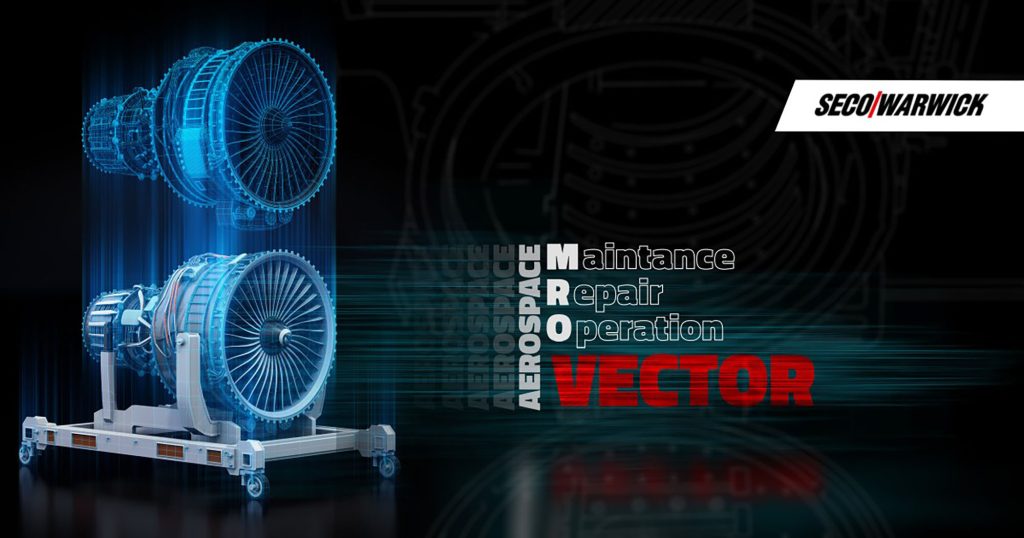SECO/WARWICK will supply an industry leader providing maintenance and repair services for jet engines with a vertical vacuum furnace with bottom-loading and gas cooling.
The Vector® vacuum furnace will be used to process components for civil aircraft jet engines. Thanks to the internal cooling gas blower as well as internal heat exchanger, the furnace is characterized by compact construction and minimum space requirements. The furnace ordered by MTU is designed in accordance with the AMS2750G standard – in the second class (II) with B-type instrumentation, as required for the aviation industry.
“The AEROSPACE/MRO industry is facing a major challenge. Interrupted supply chains and the difficult geopolitical situation in Europe means that many AEROSPACE/MRO companies have to revise their existing development and optimization strategies. Bringing the heat treatment process in-house with the purchase of this vacuum furnace allows the company to fully control the production process, and may be the key to success. We also contracted a vacuum furnace for another company from the AEROSPACE/MRO industry in Hungary. SECO/WARWICK vacuum furnaces are used in the production of components for most civil aircraft around the world”, says Maciej Korecki, Vice President of the Vacuum Segment at the SECO/WARWICK Group.
One furnace – many processes
Graphite insulation and wide heating elements ensure long-term and reliable equipment operation in industrial conditions. The following heat treatment processes can be carried out in Vector furnaces: brazing, annealing, hardening, solution heat treatment, aging, tempering, and degassing. During cooling, the cooling gas circulation with the use of a unique nozzle array system optimizes and ensures uniform cooling of the treated parts.
The Vector on order gives the customer the opportunity to conduct very efficient and clean heat treatment processes such as; brazing and annealing in high vacuum, ensuring the highest protection of the surface details when using high-alloy steels, thanks to the use of a graphite heating chamber and a diffusion pump. The capacity to carry out very efficient hardening processes is a great advantage. This is thanks to the use of cooling gas high pressures (6 bar).
Jet engine repair with SECO/WARWICK
Once again, the AEROSPACE/MRO industry chooses SECO/WARWICK furnaces. It’s not a coincidence. Suppliers of aviation parts requiring complex repairs based on brazing processes are one of the most demanding customers who need to provide repair services of the highest quality. This is a demanding sector which processes complex elements with above-average dimensions. The finished work must be characterized by high durability that meets the most stringent technical aviation standards. To execute at this level of quality, users need a reliable furnace that guarantees precision heat treatment with no room for error. The Vector vacuum furnace is such a solution.
SECO/WARWICK has provided vacuum furnaces to companies in the aviation industry many times. The company has a large body of experience manufacturing vacuum furnaces with above-average quality. The furnaces operate well in even the most demanding sectors. SECO/WARWICK furnaces produce parts for most top passenger, commercial and military aircraft. SECO/WARWICK furnaces for aviation are designed in accordance with the AMS2750G standard in the second (II) class.

With the new solution, our Partner will increase production capacity at its repair facility in Serbia.
VACUUM AS AN ECO FURNACE’S ATMOSPHERE
Vacuum furnaces use vacuum (vacuum created by air evacuation) as the protective atmosphere for the heat treated part surfaces. The vacuum furnace’s main advantage is their versatility and the ability to carry out processes traditionally carried out in atmospheric furnaces. Differences in the vacuum furnace construction as well as the method of conducting the processes minimizes both media consumption and emissions to the environment, making the vacuum furnace itself a SECO/ECO solution when compared to traditional atmosphere furnaces.
Vacuum heat treatment’s eco-friendly features include:
- perfect part surface quality (without additional operations),
- no intercrystalline oxidation (no additional mechanical treatment),
- no need to use protective gases (lower costs and emissions),
- minimal consumption of process gases (cost savings),
- minimum time for atmosphere preparation and conditioning (saving time and costs),
- zero startup and shutdown time, work on demand (saving time, costs),
- no open flame, no risk of fire or explosion (safety),
- clean process, no part washing required (reduced environmental pollution),
- low heat and by-product emissions (limited global warming effect),
- environmentally friendly (zero pollution),
- zero CO2 emissions (carbon footprint reduction).

